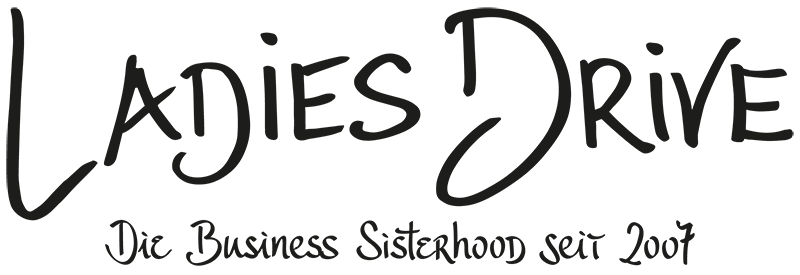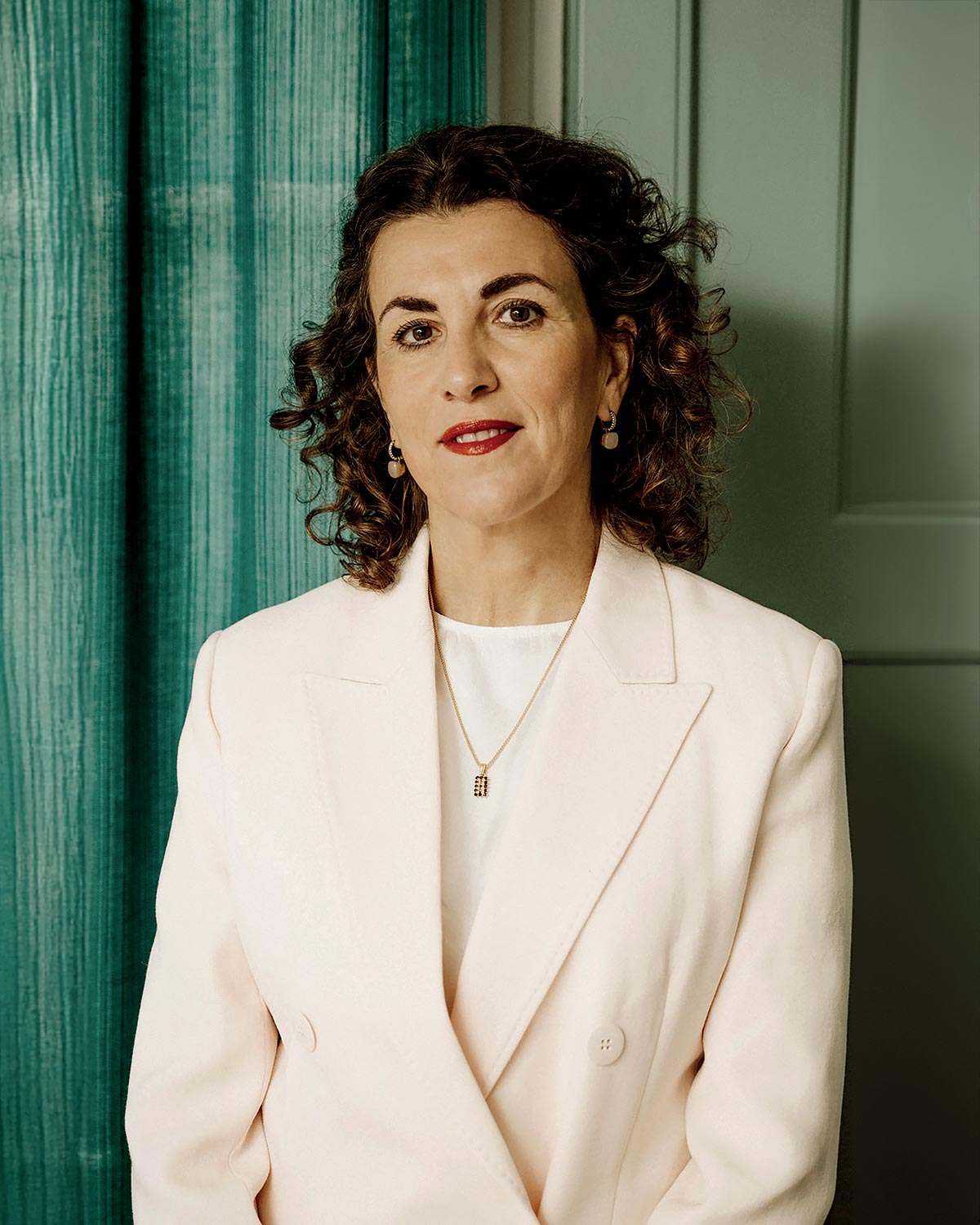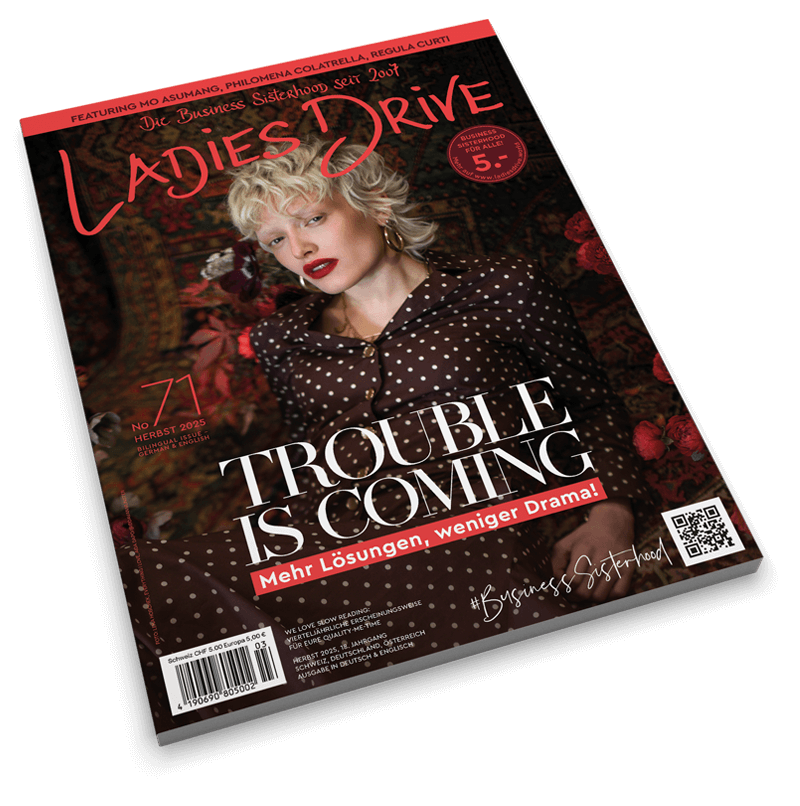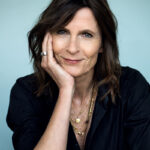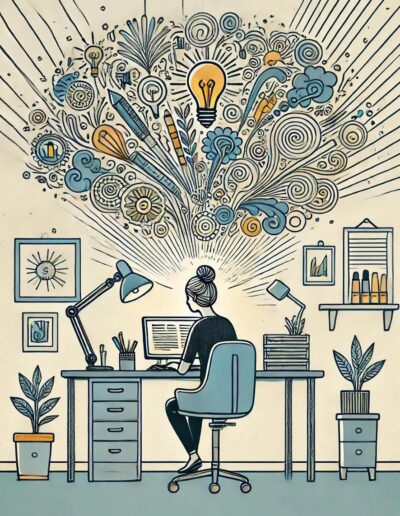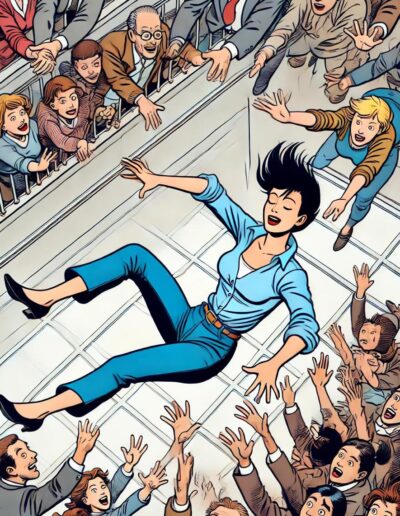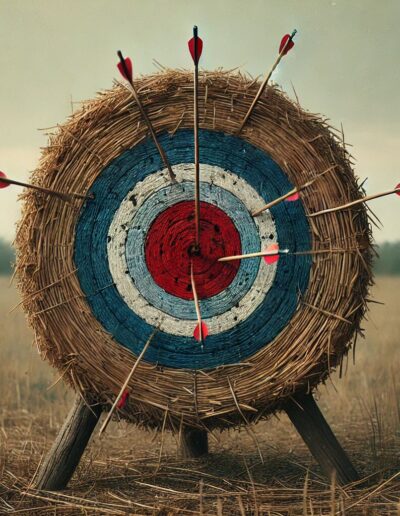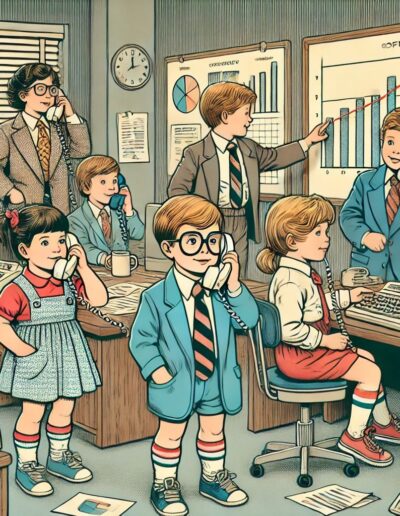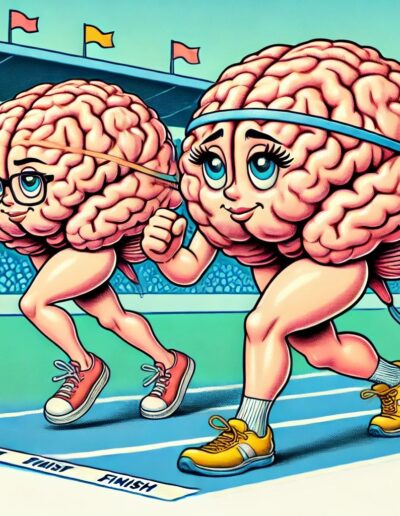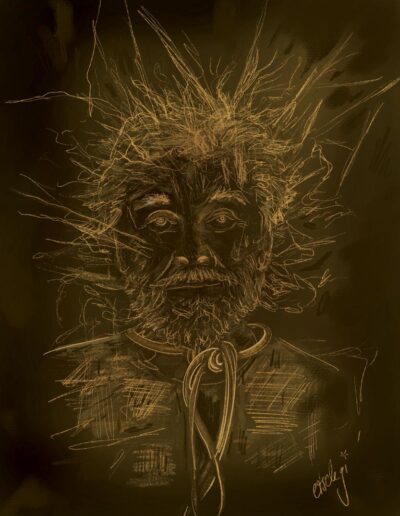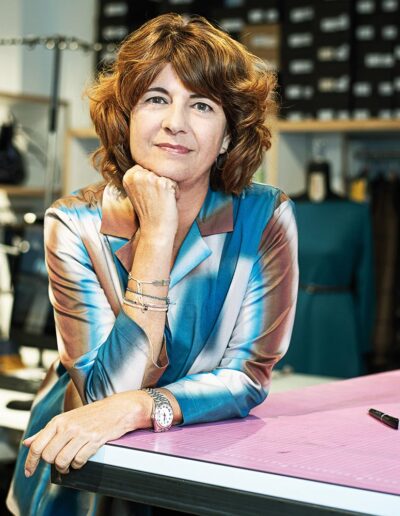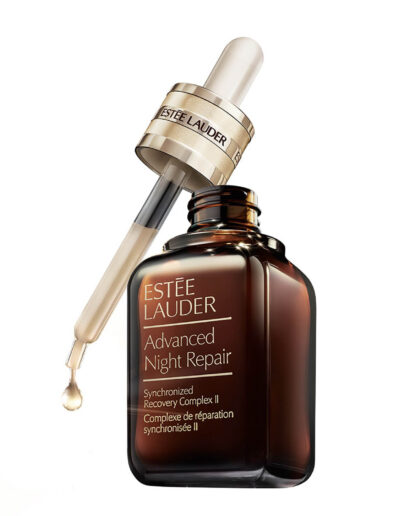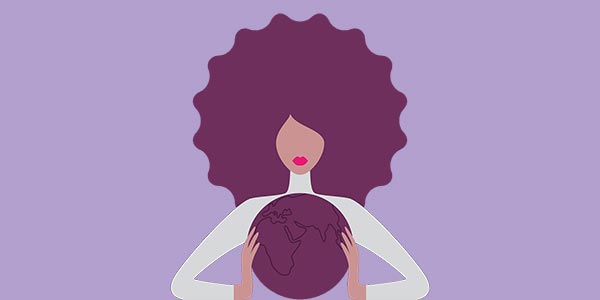As part of the 9th edition of the League of Leading Ladies Conference in Bad Ragaz last May, we were able to present the Empowering Women Award to Dr Antonella Santuccione Chadha. Dr Antonella Santuccione Chadha has become a permanent fixture in the Ladies Drive universe, which is why an interview like this feels more like a conversation between friends. Spoiler: rarely, really very rarely, does an interviewee open up as much as Dr Antonella Santuccione Chadha did.
If you have seen Dr Antonella Santuccione Chadha on stage or in one of her TEDx-Talks or anywhere officially, you have seen an immaculately dressed, beautiful woman with a very sincere yet soft expression on her face. The neuroscience scientist and founder of the Women’s Brain Project I meet today arrives in a sporty comfy outfit, her aura even more sincere and soft. Something’s ruminating in her brain. Will she share her thoughts?
Dr Antonella Santuccione Chadha: The people from TEDx asked me to do a new talk. Tomorrow I’m going to speak to them and I really have to decide: do I have something to share or not? Because I don’t know, I don’t trust myself at the moment that much.
What happened?
I have no secrets. I am a person that has barely any secrets. Almost none. When you transform – I mean we keep on transforming every day. That’s for sure. But sometimes some transformations can be very painful and require the extra energy. And I trust myself in a way that I know what I want to accomplish, but the question is: how much have you gained and lost out of the transformation?
What is the transformation all about?
I lost many friends. This is the time of your life when you lose friends. But I’m not talking about death. I’m talking about people who will give you a journey. I brought this organisation to a higher level of recognition, the science we’re doing is even more important. I got a phone call from a colleague of mine and he said, Antonella, you have many enemies, you made it, congratulations. I said, what do you mean? He didn’t share the names. And I think that’s fair, because these are common people we know. You lose important people along the journey, suddenly they turn because they are either not convinced of the journey ahead or maybe they want to have a piece of it for themselves. That’s painful for me because I’m very joyful, embracing and sharing, maybe I’m a bit naïve. Do we need enemies as a metric to our success?
You’re not naïve, you’re just very natural, blessed with emotional intelligence. And you trust people.
Yes, I trust people. As a medical doctor you are trained to trust people, your patients, otherwise if one has doubts, how can you establish a deep connection aimed at healing or cure? Nevertheless, sometimes trust has to transform towards a new journey or new people. I believe that as you grow and succeed, the dynamics in relationships can sometimes shift. Along the way, you build connections, share your journey, and people might feel close to you because they see you in moments of uncertainty or possibility. But when you achieve success, some may feel left behind, as though you no longer need them, which can bring up insecurities or doubts on their part. I’ve found that being open and trusting naturally creates deep connections, but not everyone is able to grow with you. Rather than celebrating your success, some people might feel threatened or assume that your accomplishments mean they’re no longer as important in your life. It’s not about arrogance or intentionally leaving anyone behind – sometimes people project their own insecurities when they see someone else progressing. Navigating these changes in relationships requires a lot of strength and belief in the cause you are bringing forward.
The downside of being successful. You were chosen to receive the Female Empowerment Award. Share with us a daily example of how you empower others, please.
We have to learn to delegate. And for women, the delegation part is the most difficult thing. I think I was very good with this, often I am asked: how have you succeeded? You worked in big corporations, you’ve been working in the United States, back and forth. My answer: I delegate. I have been able to delegate all the tasks for which I thought I was not necessary in execution, but rather overviewing and guiding. I was giving the opportunity to others – above all women – to work and grow. All the people that work with me, all of them, in my household and also in my other roles, they all grow, they all were striving to study or get the next leadership role.
How did the Women’s Brain Project come to life?
There was a personal part, a personal story. In 2008 I was gratefully pregnant with a baby girl; the joy was soon abruptly interrupted as the terrible news was that she didn’t have the scalp formed, it’s called anencephaly. It was a very tough moment for me and my husband. I felt completely defeated as a doctor, as a neuroscientist, as a spouse, as a future mother, and I was asking myself, why did it happen? Then I checked the science behind it, because I am a scientist, and with great surprise I read that anencephalia seems to happen more in the female foetus. I overcame this somehow, I certainly wanted to have a family and become a mother. After another two miscarriages I had my two sons. 2014 I was working as a regulator at Swissmedic approving drugs for the Swiss market. This is when I found my professional reason to transform my tragedy into something revolutionary. In fact, I was realising that women’s representation in clinical trials was not significant enough to understand how disease can impact men and women differently. And this is when I went back to my colleagues at university and I said, let’s make an association that studies this. We kept on growing and growing in terms of science. It was still a hobby – a fully pro bono work – while working in other organisations. This way, I was able to cross-pollinate both organisations, bringing the network within the association and the perspective of sex and gender medicine to the corporations for which I was officially working. This is the perfect way to transform: we didn’t go against the system, but we transformed from within, from the entire ecosystem, regulatory, drug development, academia, organisations like yours – that all together worked to accomplish this final goal.
We had many publications. 2018 we came out with our first important one, which was a publication in Nature Neurology Review about sex and gender differences in Alzheimer’s disease; and this was a big bang because then the BBC called and they wanted an interview, the Financial Times called and wanted an interview, and you know for us to speak with the press was something completely new. I mean, how do you talk to a journalist? That’s not something that a scientist or a doctor knows because you speak with your peers, you speak with other scientists, with patients, but you don’t talk with journalists. Then two publications, three publications, we made three forums that brought together the academic community, the pharmaceutical industry, patients, some Hollywood/Bollywood stars. And we started to gain this momentum. You know, everything happened here in Switzerland between Zurich and Lausanne. We are now working on the follow up to that science and will be published again soon.
After Covid-19 we started to realise that we need to change our status, we need to become a foundation for several reasons. And the first reason is because if you are a foundation, the Swiss National Foundation might give you the status of research institute. And that’s what I wanted. For me, the research is very important. One day soon we might be recognised officially by the Swiss National Foundation SNF as a research institute. We are working on it, it’s very difficult. I’ve never worked to make a research institute anywhere else in the world and before in my life, but I’m not giving up. We will find the funding, which is actually the only missing item. All the other requirements have been finally acknowledged by SNF, from the science to our mission and tax exemption status of the Foundation. Can you imagine the joy and pride of getting here? About the fund and money, I will continue to negotiate with whoever is interested, even though some negotiations go on for months and freeze or end in a dead end, but I will find a way to overcome this.
It’s hard to believe that something as important as the Women’s Brain Project has to beg for funding …
The Swiss National Foundation has given 11 million to fund sex and gender research for the next four years, for all the projects in the country to foster gender medicine. Eleven million, four years. Do you know how much the house for the elephant costs in Zurich Zoo? Seventy million. With all my love and respect for elephants, my husband comes from India, so for us elephants are almost sacred. But in theory, elephants have more money than women have to solve problems related to health issues in this country and around the world. You know how much the Lindt Museum factory costs? I love that place: 140 million. The numbers I am sharing are just to put science and funding for women’s health into perspective versus rest of the world.
How do you stay healthy and sane in all this fighting for your institute?
With each rejection I think I became very much stronger and aware. I think that I’m in a very strong mental space. I’ve told everybody what has to be done, what is wrong and what is right for women’s health. I showed the way. We will make the research institute, I’m sure. But in theory, also someone else can do it instead of me. Because I have literally pioneered the change for women’s health. Maybe now it is the turn of someone else? I think it’s nice to see now that there are many colleagues here and there who are just spreading it and enlarging sex and gender medicine, because one person can’t do it alone, right? And one more thing. Do you think that the problem of cancer would only be solved by one research institute? No, of course not. Maybe that’s why we need many research institutes for sex and gender medicine.
You need the whole world to make a change. Are you the only project focusing on women’s brains worldwide?
No, we have a few that are popping up in the United States. But it’s more like within academia. And it’s always like a department. It’s a small part where a little research is being done in this direction. But our vision is really the first research institute like the Tropical Institute in Basel or the Cancer Institute. I’m just afraid that it takes a lifetime. I cannot wait because women are dying because of side effects or diseases that have no cure. This is serious. We cannot wait as women.
What needs to be done?
It should be the women around the world. It should be academia. It should be the political will. Or it should be someone like a philanthropist that now comes and says, here, you have millions to carry on. This is not easy because it is implying good sales skills. I am not good in that. I think that’s my mistake, my limit. Because I have the arrogance, and this is where I’m really arrogant. I’m saying, this is such an important topic. It is so obvious that it must be financed. This is important for each single woman on this planet. They should come to us. Money should come naturally. That’s my arrogance. I don’t get it. Why should we go begging, please give us this money to do this research?
Importantly, we have established a fund-raising campaign called the Women’s Quota*. Because women do not deserve to be the majority of those living with dementia, depression, migraine, multiple sclerosis or being the majority of caregivers. I think if each woman in Switzerland would donate one franc, we would get the millions for our independent research.
But you are not demoralised …
No. I’m now creating an incubator. My idea is that all start-ups that do innovation on women’s health and mental health work under our umbrella of the foundation. That’s the only way I can generate this money before I have my own millions. So basically, we are putting all these start-ups under our roof, we are helping them to get older and stronger. And then the deal is that once they have an exit, once they have an IPO, once they have revenues, they donate a percentage to the foundation. The good thing is that I am blessed for a simple reason. I am surrounded by people who are brilliant, and they always want to help. So whenever you have people that are really smart around the table – okay, there can be a betrayal, there can be a loss, there can be …, but the rest stay and help you to flourish with your ideas, so I’m very happy and grateful.
One last question. You got lots of awards. They seem not to help. Do they do any good?
They make you stronger in the way you stand behind your cause. You get an inner energy, an intrinsic energy, because the energy comes from outside. And it makes you more robust. If you go to speak to global leaders and philanthropists, you know what you’re talking about. You feel self-confident. It’s also a training. You expose yourself, you tell your story, you get the recognition for what you do. And maybe it’s not going to be you who will succeed in making that institute. It doesn’t have to be me. I told you, I’ve already done an incredible amount. Maybe there will be someone else that will do it. But at this point, it has to be done.
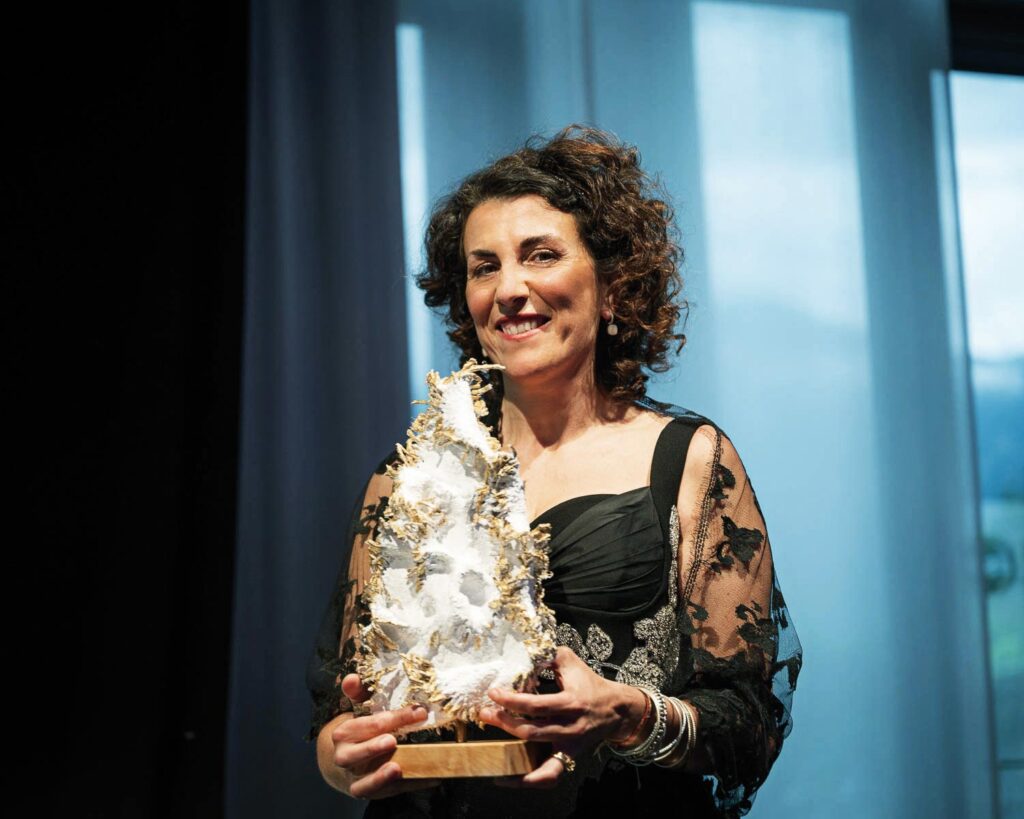
The medical doctor and neuroscientist Dr Antonella Santuccione Chadha founded the Women’s Brain Project (WBP) in 2017 with the aim of investigating the influence of gender differences on the brain and mental illnesses. The core of the research is that diseases never develop in the same way in women and men and therefore medications also work differently. Dr Santuccione Chadha’s work and impact therefore not only has a great influence on her immediate environment, but on women all over the world. According to her figures, 80 per cent of dementia patients are female, for example. Dr Antonella Santuccione Chada is regarded as one of the great international pioneers in the field of gender medicine, which is so urgently needed.
On the 22nd March 2024, Dr Santuccione Chadha transformed the Association into a tax-exempt Foundation registered in Basel, Switzerland. Her name is included in the Katherinenturm, Zurich.
Click Here to Support the Women’s Quota Awareness Campaign
More about her keynote at the League of Leading Ladies Conference 2025:
